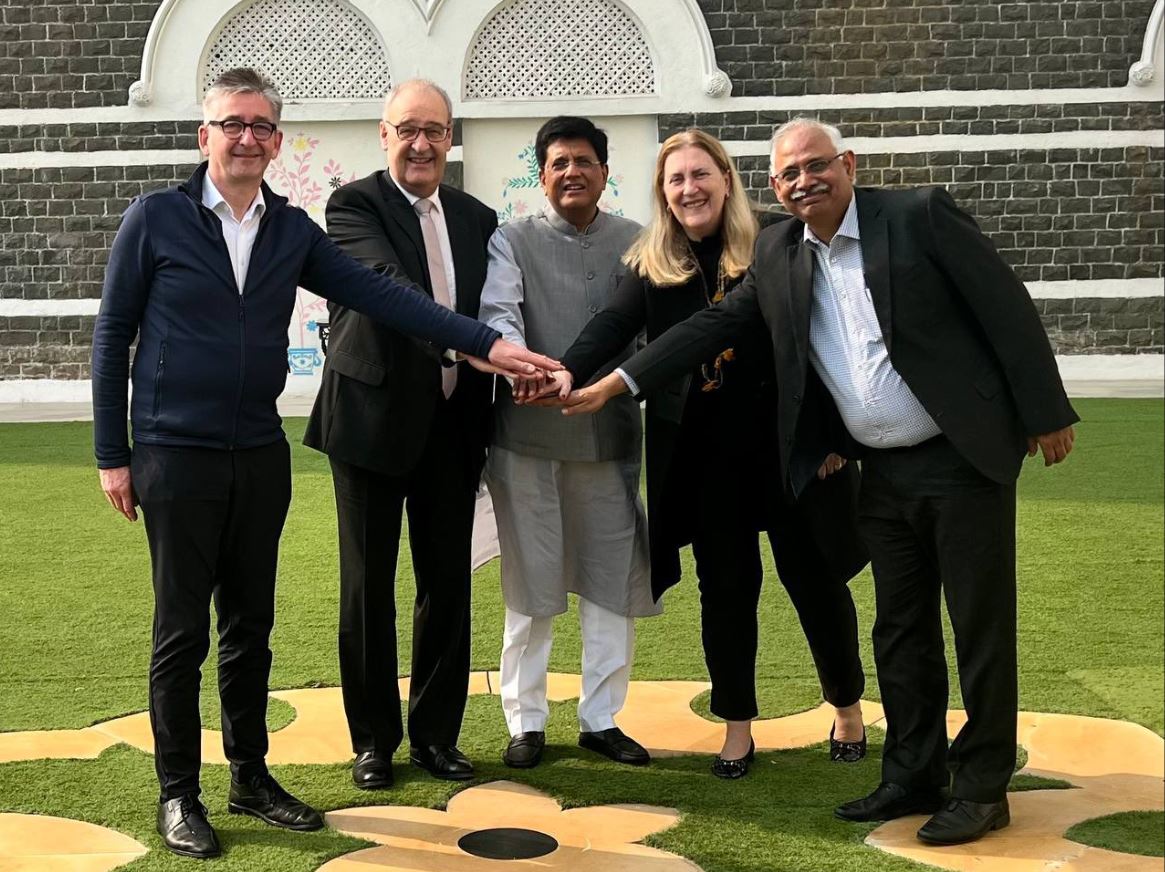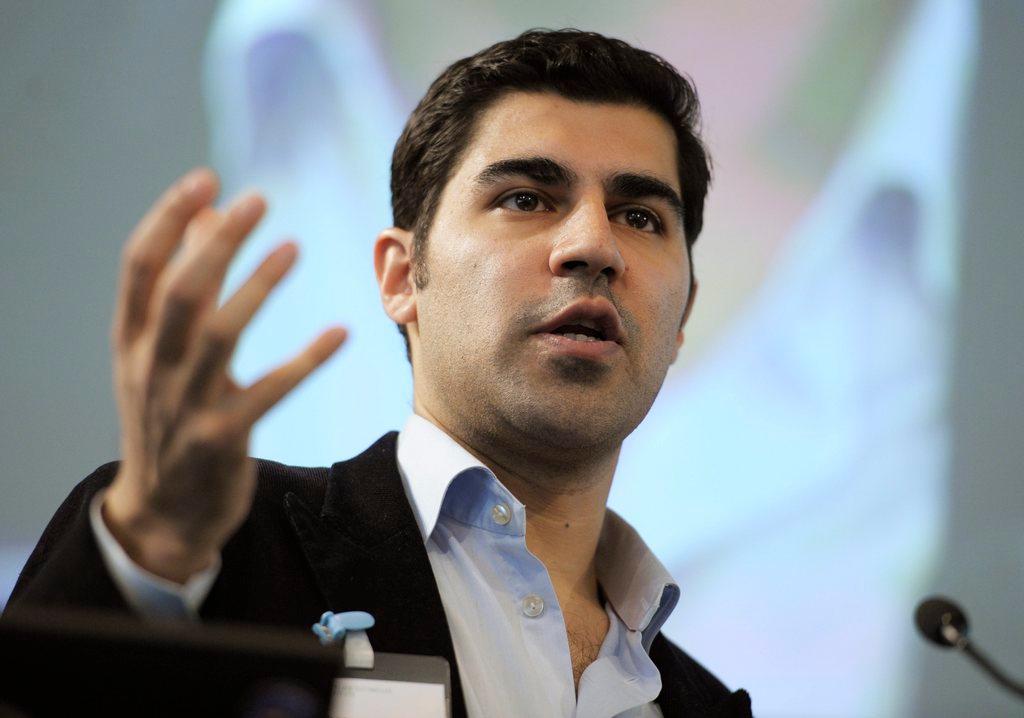A trade deal with India would give Switzerland ‘a head start’

Signing a long-anticipated free trade deal with India could lead to Switzerland becoming “a gateway for India to market its products throughout Europe,” says American political scientist Parag Khanna.
Switzerland, together with other members of the European Free Trade Association (EFTA), is getting closer to signing a free trade agreement with India. Economics Minister Guy Parmelin recently told the media that the final details of an accord are now being worked out.
While on a stop in Davos to attend the World Economic Forum in January, Parag Khanna spoke with SWI swissinfo.ch about global migration and the anticipated FTA between India and EFTA.
SWI swissinfo.ch: In your 2021 book, Move: Where People are Going for a Better Future, you focus on the massive global human migration taking place because of climate change, demography and conflict. You see the vast uninhabited northern regions of Canada, Northern Europe, Siberia and Central Asia as possible destinations. Considering that migration has been one of the hottest topics in our domestic policy for 50 years, does this mean Switzerland can now sit back and relax?
Parag Khanna: When it comes to migration, Switzerland is very self-assured. It has good control of its borders when it comes to third countries [outside Europe] and is very selective. Many of these immigrants come from Asia. They have assimilated well and make an important contribution to the Swiss economy.
.

Megatrends, such as climate change, migration, geopolitical conflicts and civil wars, mean that people from Asia are coming to Europe in greater numbers, as are people from Arab and African countries.
Switzerland must, of course, protect its own stability, even when the issue is politically delicate and when it is sometimes accused of not being generous or merciful enough. It is already doing this, through free trade agreements and building close commercial relations with countries that are rich in talent, such as Asian countries.
SWI: Given the melting permafrost and the cutting down of forests that the planet needs as its “green lungs”, isn’t your vision of a populated Siberia somewhat adventurous?
P.K.: In the book, I wrote that the movement of people from Asia towards the north has already begun. This is not science fiction. Yes, there are barriers such as politics, borders, geographical distances and costs, but a growing number of people from India, Pakistan and other countries have already migrated to Siberia and Central Asia, including Kazakhstan and Uzbekistan.
I have been visiting these countries for 30 years. Each time I go there, I see not only the seasonal agricultural workers, but also many Asians working in the building industry and as English teachers, opticians and cooks in canteens and hotels.
In 2018, Russian President Vladimir Putin, who is certainly no friend of foreigners, made an agreement with India’s Prime Minister Narendra Modi to allow the exchange of certain skilled workers between Russia and India. In fact, more and more people from Asia are travelling to Russian territories. Romania and Greece have also recently made similar agreements with India. The aim is to compensate for labour shortages resulting from demographic imbalances.
SWI: How significant is the free trade agreement that Switzerland and the three other EFTA countries [Norway, Iceland and Liechtenstein] are now finalising with India?
P.K.: Switzerland has done a great job because the free trade agreement is an important foreign economic and diplomatic success. In contrast to the European Union and Britain, Switzerland has taken action. The EU and Britain talked with India and travelled there, but they were not able to reach a free trade agreement.
Switzerland now has a head start, which I see as very clever. It is now likely to become a gateway for India to market Indian products, which are getting better and better, throughout Europe.
Swiss industry will also profit from this success. The demand for Swiss advanced technology will increase because India will be the next China. But to achieve this, its industrial production processes have to improve dramatically. India can reach this goal by importing advanced technology from Switzerland and Germany.
SWI: Has this Swiss foreign economic policy success had any influence in the diplomatic arena? This year, Switzerland is organising a global peace summit on Ukraine and would also like to bring India on board.
P.K.: No. There has been cooperation in other areas, but the response to the peace summit was a clear no.
SWI: Why such a categorical rejection?
P.K.: India has its own foreign policy interests. It has deepened its relationship with Russia and has entered into close cooperation with Putin. As far as energy market policy and the agenda in Asia are concerned, India is pursuing its own strategy.
SWI: What possible further cooperation do you see? We recently reported on a world record-breaking exchange between Swiss secondary-school students from the city of Lucerne and their peers from Kerala. Given the distance of 7,500 kilometres, this cannot be seen as a model.
P.K.: Student exchanges between universities and technical high schools are always very important. The European Erasmus [education support] programme is a huge success. Compare that with the exchanges between the US and China. Because of tensions between those two countries, the total number of American students studying in China has decreased to around 200.
SWI: Russia openly opposes human rights, individual freedoms and democracy. Given India’s close alliance with Russia, is there any sustainable common ground between India and Switzerland?
P.K.: Yes, there is. The common ground exists primarily on a functional level, specifically the desire for greater exchange in technology.
But when Indian students, teachers and specialists from the technical fields come to Switzerland to learn here, this also leads to stronger personal and family ties. This, in turn, has a positive effect on the common good.
That’s how a relationship of trust can develop between the two societies – through exchange, like the one that’s developed between India and the US. I, myself, am an American with Indian roots and a family in India.
Edited by Benjamin von Wyl. Adapted from German by Sue Brönnimann/gw

In compliance with the JTI standards
More: SWI swissinfo.ch certified by the Journalism Trust Initiative












You can find an overview of ongoing debates with our journalists here . Please join us!
If you want to start a conversation about a topic raised in this article or want to report factual errors, email us at english@swissinfo.ch.